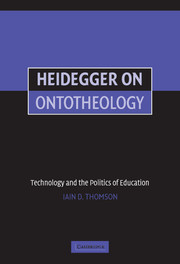Book contents
- Frontmatter
- Contents
- Acknowledgments
- A Note on the Notes
- Abbreviations Used for Works by Heidegger
- Introduction: Heidegger on Ontotheology
- 1 Ontotheology? Understanding Heidegger's Deconstruction of Metaphysics
- 2 Understanding Ontotheology as the Basis for Heidegger's Critique of Technology
- 3 Heidegger and the Politics of the University
- 4 Heidegger's Mature Vision of Ontological Education, or How We Become What We Are
- References
- Index
4 - Heidegger's Mature Vision of Ontological Education, or How We Become What We Are
Published online by Cambridge University Press: 28 July 2009
- Frontmatter
- Contents
- Acknowledgments
- A Note on the Notes
- Abbreviations Used for Works by Heidegger
- Introduction: Heidegger on Ontotheology
- 1 Ontotheology? Understanding Heidegger's Deconstruction of Metaphysics
- 2 Understanding Ontotheology as the Basis for Heidegger's Critique of Technology
- 3 Heidegger and the Politics of the University
- 4 Heidegger's Mature Vision of Ontological Education, or How We Become What We Are
- References
- Index
Summary
INTRODUCTION: DECONSTRUCTING EDUCATION
In his later work, Heidegger sought to deconstruct education. Rather than deny this, we should simply reject the polemical reduction of “deconstruction” (Destruktion) to “destruction” (Zerstörung), and instead be clear that the goal of Heidegger's deconstruction of education, like his deconstruction of the ontological tradition in general, is not to destroy our traditional Western educational institutions, but rather to “loosen up” this “hardened tradition and dissolve the concealments it has engendered,” in order to “recover” from the beginning of the educational tradition those “primordial experiences” that have fundamentally shaped its subsequent historical development (B&T 44/S&Z 22). Heidegger's deconstructions are so far from being simple destructions that not only do they always include a positive as well as a negative moment, but this negative moment, in which the sedimented layers of distorting interpretations are cleared away, is invariably in the service of the positive moment, in which something long concealed is recovered (as we saw in the Chapter 1). To understand how this double deconstructive strategy operates in the case of education, then, we need simply clarify and develop these two moments: What distortions does Heidegger's deconstruction of education seek to cut through? And, more important, what does it seek to recover? Let us outline the answer to this second, more important question first.
Through a hermeneutic excavation of Plato's famous “allegory of the cave” in the Republic – the textual site where pedagogical theory emerged from the noonday shadows of Orphic mystery and Protagorean obscurity in order to institute, for the first time, the “Academy” as such – Heidegger seeks to place before our eyes the most influential understanding of “education” in Western history: Plato's conception of paideia.
- Type
- Chapter
- Information
- Heidegger on OntotheologyTechnology and the Politics of Education, pp. 141 - 182Publisher: Cambridge University PressPrint publication year: 2005
- 1
- Cited by



